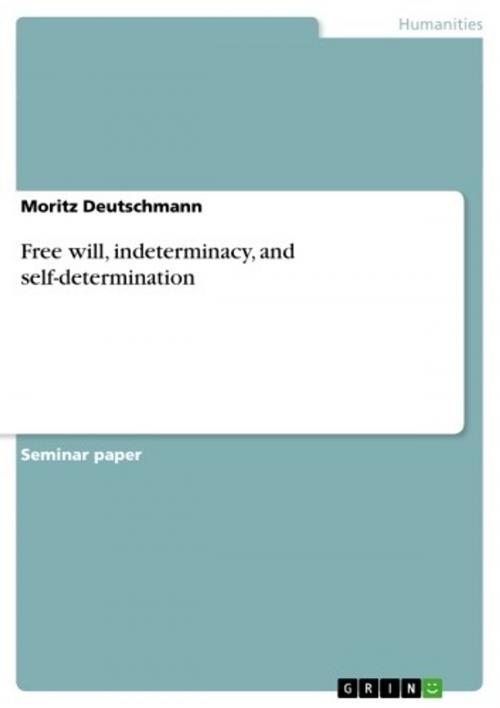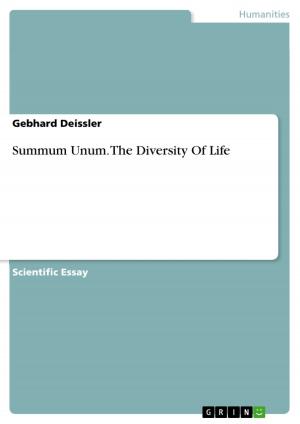| Author: | Moritz Deutschmann | ISBN: | 9783638830300 |
| Publisher: | GRIN Publishing | Publication: | July 25, 2007 |
| Imprint: | GRIN Publishing | Language: | English |
| Author: | Moritz Deutschmann |
| ISBN: | 9783638830300 |
| Publisher: | GRIN Publishing |
| Publication: | July 25, 2007 |
| Imprint: | GRIN Publishing |
| Language: | English |
Seminar paper from the year 2007 in the subject Philosophy - Theoretical (Realisation, Science, Logic, Language), grade: A- (=1,25), University of California, Berkeley (Department of Philosophy), course: Collective Intentionality (John Searle), 18 entries in the bibliography, language: English, abstract: Free will is one of the most fundamental presuppositions that we make in our everyday lives. At the same time, free will belongs to the concepts that are most difficult to integrate into a scientific idea of how the world works. This contrast has haunted philosophers for centuries, and although it seems that almost everything has already been said about this topic, there has been an animated debate in recent decades. In this paper, I would like to consider two of the positions adopted in this debate. At first, I would like to explore John Searle's interpretation of free will as a sequence of several moments of indeterminacy ('gaps') between the reasons for our actions and the actions themselves. I think the best way to understand his conception is to see it as an attempt to unite two different ideas about the relation between reasons and actions. On the one hand, the realist conception of Searle's philosophy presupposes that the reasons for our actions must have real causal power and are not only post facto justifications. On the other hand, Searle's understanding of rationality implies that reasons alone cannot be sufficient causes. In 'Rationality in Action' Searle tries to bring both ideas together through the notion of an agent-self. I will argue that this attempt is problematic, not only because it leads our conception of free will towards a very unsatisfying choice between epiphenomenalism and natural indeterminism, but also because Searle cannot explain convincingly how the existence of indeterminacy in our brains could explain free will. The second part of the paper is an attempt to develop an alternative notion of free will, relying on two influential articles by Harry Frankfurt and Peter Strawson. The basic idea is that when we are interested in free will, we are not primarily interested in causal origins, but in self-determination, which is also the main presupposition in the practice of holding people responsible. With this perspective in mind, I will finally return to the questions of the natural foundations of free will and its compatibility with a deterministic conception of nature.
Seminar paper from the year 2007 in the subject Philosophy - Theoretical (Realisation, Science, Logic, Language), grade: A- (=1,25), University of California, Berkeley (Department of Philosophy), course: Collective Intentionality (John Searle), 18 entries in the bibliography, language: English, abstract: Free will is one of the most fundamental presuppositions that we make in our everyday lives. At the same time, free will belongs to the concepts that are most difficult to integrate into a scientific idea of how the world works. This contrast has haunted philosophers for centuries, and although it seems that almost everything has already been said about this topic, there has been an animated debate in recent decades. In this paper, I would like to consider two of the positions adopted in this debate. At first, I would like to explore John Searle's interpretation of free will as a sequence of several moments of indeterminacy ('gaps') between the reasons for our actions and the actions themselves. I think the best way to understand his conception is to see it as an attempt to unite two different ideas about the relation between reasons and actions. On the one hand, the realist conception of Searle's philosophy presupposes that the reasons for our actions must have real causal power and are not only post facto justifications. On the other hand, Searle's understanding of rationality implies that reasons alone cannot be sufficient causes. In 'Rationality in Action' Searle tries to bring both ideas together through the notion of an agent-self. I will argue that this attempt is problematic, not only because it leads our conception of free will towards a very unsatisfying choice between epiphenomenalism and natural indeterminism, but also because Searle cannot explain convincingly how the existence of indeterminacy in our brains could explain free will. The second part of the paper is an attempt to develop an alternative notion of free will, relying on two influential articles by Harry Frankfurt and Peter Strawson. The basic idea is that when we are interested in free will, we are not primarily interested in causal origins, but in self-determination, which is also the main presupposition in the practice of holding people responsible. With this perspective in mind, I will finally return to the questions of the natural foundations of free will and its compatibility with a deterministic conception of nature.















